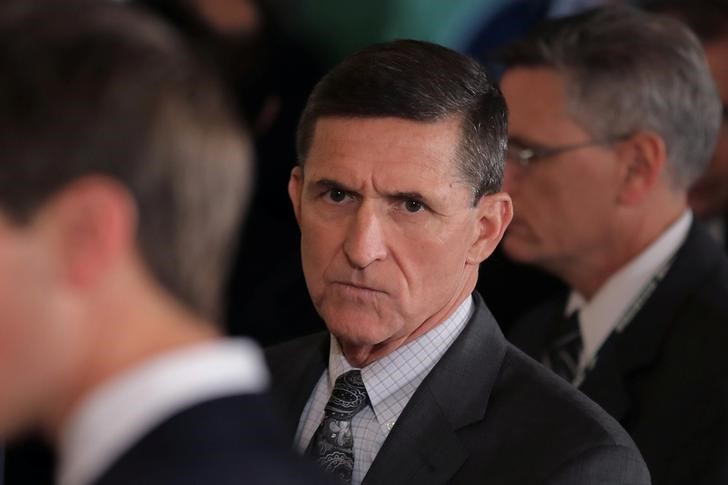By Mark Hosenball
WASHINGTON (Reuters) - U.S. President Donald Trump on Friday backed a decision by his former national security adviser to seek immunity in congressional investigations of possible ties between his election campaign and Russia, but there was no immediate sign that the request would be granted.
Retired General Michael Flynn, who resigned only 24 days after becoming national security adviser, wants protection against "unfair prosecution" if he testifies before the intelligence committees of the U.S. Senate and the House of Representatives, his lawyer, Robert Kelner, said on Thursday.
Testimony from Flynn could help shed light on the conversations he had last year with Sergei Kislyak, Russian ambassador to the United States, while national security adviser for Trump's presidential campaign.
Trump, a Republican, said in a tweet that Democrats were instigating the congressional investigations because they were upset about his Nov. 8 victory over their party's candidate, Hillary Clinton.
"Mike Flynn should ask for immunity in that this is a witch hunt (excuse for big election loss), by media & Dems, of historic proportion!" Trump said.
Trump would not comment further when asked about Flynn during a White House meeting with U.S. manufacturers.
White House spokesman Sean Spicer told reporters he was not concerned that Flynn could provide information that could be harmful to the administration. He said Trump wanted Flynn to testify to "get this matter behind us" but declined to say specifically that he should be granted immunity.
"The president is very clear that he wants Mike Flynn to go and be completely open and transparent with the committee, and whatever it takes to do that he is supportive of," Spicer said.
TOO SOON
U.S. Representative Adam Schiff, ranking Democrat on the House of Representatives intelligence committee, said it was too soon to consider immunity requests.
"As with any investigation - and particularly one that grows in severity and magnitude by the day - there is still much work and many more witnesses and documents to obtain before any immunity request from any witness can be considered," Schiff said in a statement.
Schiff said the panel would discuss any request with the Justice Department and the Senate Intelligence Committee, describing such a request "a grave and momentous step."
Schiff went to the White House on Friday at the administration's invitation to review documents that it said support Trump's contention he and his team were subjected to surveillance by the Obama administration during the presidential campaign.
The Republican chairman of the House Intelligence Committee, Devin Nunes, has been criticized by his colleagues on the panel for his handling of the investigation of possible Russian connections, including going to the White House complex independently to review documents on the purported surveillance.
FBI Director James Comey has said there is no evidence of wiretapping at Trump Tower in New York but that the agency is investigating whether the Trump campaign colluded with Russia.
Senator Angus King, a member of the Senate Intelligence Committee, also said it was too soon to discuss immunity.
A government official with direct knowledge of the case told Reuters that lawyers for Flynn raised the immunity request roughly 10 days ago with representatives of the Senate panel.
Officials told them the committee was not interested in any immunity discussions at that time.
The Wall Street Journal reported on Friday that Flynn had also sought immunity from the Federal Bureau of Investigation in exchange for testimony.
Flynn was forced to resign on Feb. 13 for failing to disclose talks with Kislyak about U.S. sanctions on Moscow and misleading Vice President Mike Pence about the conversations, which occurred before Trump took office.
Congressional committees and the FBI are looking into allegations by U.S. intelligence agencies that Russia meddled in the 2016 U.S. election campaign.
The Russian government has denied the allegations and denied that it hacked emails of Democratic groups and released information to tip the election toward Trump, who has called for better U.S. relations with Moscow.
In a CNN interview on Friday, King defended the investigations. "This is not a witch hunt," King said. "This is an effort to get to the truth of some very important questions.

"There is no doubt whatsoever that the Russians were behind an effort to interfere in our elections," he said. "To continue to deny that - it just flies in the face of all of the reality."